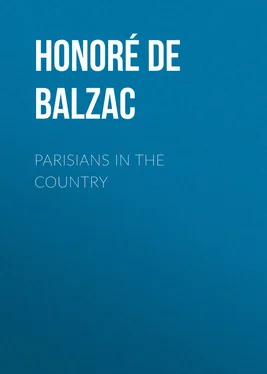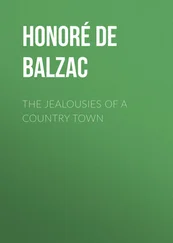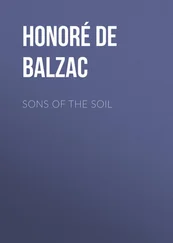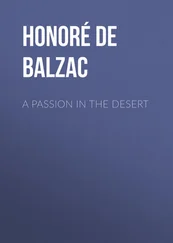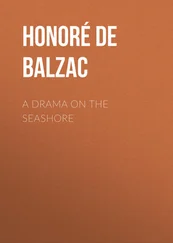Honoré Balzac - Parisians in the Country
Здесь есть возможность читать онлайн «Honoré Balzac - Parisians in the Country» — ознакомительный отрывок электронной книги совершенно бесплатно, а после прочтения отрывка купить полную версию. В некоторых случаях можно слушать аудио, скачать через торрент в формате fb2 и присутствует краткое содержание. Жанр: literature_19, foreign_antique, foreign_prose, на английском языке. Описание произведения, (предисловие) а так же отзывы посетителей доступны на портале библиотеки ЛибКат.
- Название:Parisians in the Country
- Автор:
- Жанр:
- Год:неизвестен
- ISBN:нет данных
- Рейтинг книги:4 / 5. Голосов: 1
-
Избранное:Добавить в избранное
- Отзывы:
-
Ваша оценка:
- 80
- 1
- 2
- 3
- 4
- 5
Parisians in the Country: краткое содержание, описание и аннотация
Предлагаем к чтению аннотацию, описание, краткое содержание или предисловие (зависит от того, что написал сам автор книги «Parisians in the Country»). Если вы не нашли необходимую информацию о книге — напишите в комментариях, мы постараемся отыскать её.
Parisians in the Country — читать онлайн ознакомительный отрывок
Ниже представлен текст книги, разбитый по страницам. Система сохранения места последней прочитанной страницы, позволяет с удобством читать онлайн бесплатно книгу «Parisians in the Country», без необходимости каждый раз заново искать на чём Вы остановились. Поставьте закладку, и сможете в любой момент перейти на страницу, на которой закончили чтение.
Интервал:
Закладка:
Honoré de Balzac
Parisians in the Country
INTRODUCTION
I have sometimes wondered whether it was accident or intention which made Balzac so frequently combine early and late work in the same volume. The question is certainly insoluble, and perhaps not worth solving, but it presents itself once more in the present instance. L’Illustre Gaudissart is a story of 1832, the very heyday of Balzac’s creative period, when even his pen could hardly keep up with the abundance of his fancy and the gathered stores of his minute observation. La Muse du Departement dates ten years and more later, when, though there was plenty of both left, both sacks had been deeply dipped into.
L’Illustre Gaudissart is, of course, slight, not merely in bulk, but in conception. Balzac’s Tourangeau patriotism may have amused itself by the idea of the villagers “rolling” the great Gaudissart; but the ending of the tale can hardly be thought to be quite so good as the beginning. Still, that beginning is altogether excellent. The sketch of the commis-voyageur generally smacks of that physiologie style of which Balzac was so fond; but it is good, and Gaudissart himself, as well as the whole scene with his epouse libre , is delightful. The Illustrious One was evidently a favorite character with his creator. He nowhere plays a very great part; but it is everywhere a rather favorable and, except in this little mishap with Margaritis (which, it must be observed, does not turn entirely to his discomfiture), a rather successful part. We have him in Cesar Birotteau superintending the early efforts of Popinot to launch the Huile Cephalique. He was present at the great ball. He served as intermediary to M. de Bauvan in the merciful scheme of buying at fancy prices the handiwork of the Count’s faithful spouse, and so providing her with a livelihood; and later as a theatrical manager, a little spoilt by his profession, we find him in Le Cousin Pons . But he is always what the French called “a good devil,” and here he is a very good devil indeed.
Although La Muse du Departement is an important work, it cannot be spoken of in quite unhesitating terms. It contains, indeed, in the personage of Lousteau, one of the very most elaborate of Balzac’s portraits of a particular type of men of letters. The original is said to have been Jules Janin, who is somewhat disadvantageously contrasted here and elsewhere with Claude Vignon, said on the same rather vague authority to be Gustave Planche. Both Janin and Planche are now too much forgotten, but in both more or less (and in Lousteau very much “more”) Balzac cannot be said to have dealt mildly with his bete noire , the critical temperament. Lousteau, indeed, though not precisely a scoundrel, is both a rascal and a cad. Even Balzac seems a little shocked at his lettre de faire part in reference to his mistress’ child; and it is seldom possible to discern in any of his proceedings the most remote approximation to the conduct of a gentleman. But then, as we have seen, and shall see, Balzac’s standard for the conduct of his actual gentlemen was by no means fantastically exquisite or discouragingly high, and in the case of his Bohemians it was accommodating to the utmost degree. He seems to despise Lousteau, but rather for his insouciance and neglect of his opportunities of making himself a position than for anything else.
I have often felt disposed to ask those who would assert Balzac’s absolute infallibility as a gynaecologist to give me a reasoned criticism of the heroine of this novel. I do not entirely “figure to myself” Dinah de la Baudraye. It is perfectly possible that she should have loved a “sweep” like Lousteau, there is certainly nothing extremely unusual in a woman loving worse sweeps even than he. But would she have done it, and having done it, have also done what she did afterwards? These questions may be answered differently; I do not answer them in the negative myself, but I cannot give them an affirmative answer with the conviction which I should like to show.
Among the minor characters, the substitut de Clagny has a touch of nobility which contrasts happily enough with Lousteau’s unworthiness. Bianchon is as good as usual; Balzac always gives Bianchon a favorable part. Madame Piedefer is one of the numerous instances in which the unfortunate class of mothers-in-law atones for what are supposed to be its crimes against the human race; and old La Baudraye, not so hopelessly repulsive in a French as he would be in an English novel, is a shrewd old rascal enough.
But I cannot think the scene of the Parisians blaguing the Sancerrois is a very happy one. That it is in exceedingly bad taste might not matter so very much; Balzac would reply, and justly, that he had not intended to represent it as anything else. That the fun is not very funny may be a matter of definition and appreciation. But what scarcely admits of denial or discussion is that it is tyrannously too long. The citations of Olympia are pushed beyond measure, beyond what is comic, almost beyond the license of farce; and the comments, which remind one rather of the heavy jesting on critics in Un Prince de la Boheme and the short-lived Revue Parisienne , are labored to the last degree. The part of Nathan, too, is difficult to appreciate exactly, and altogether the book does not seem to me a reussite .
The history of L’Illustre Gaudissart is, for a story of Balzac’s, almost null. It was inserted without any previous newspaper appearance in the first edition of Scenes de la Vie de Province in 1833, and entered with the rest of them into the first edition also of the Comedie , when the joint title, which it has kept since and shared with La Muse du Departement , of Les Parisiens en Province was given to it.
La Muse du Departement has a rather more complicated record than its companion piece in Les Parisiens en Province , L’Illustre Gaudissart . It appeared at first, not quite complete and under the title of Dinah Piedefer , in Le Messager during March and April 1843, and was almost immediately published as a book, with works of other writers, under the general title of Les Mysteres de Province , and accompanied by some other work of its own author’s. It had four parts and fifty-two chapters in Le Messager , an arrangement which was but slightly altered in the volume form. M. de Lovenjoul gives some curious indications of mosaic work in it, and some fragments which do not now appear in the text.
George Saintsbury
THE ILLUSTRIOUS GAUDISSART
CHAPTER I
The commercial traveller, a personage unknown to antiquity, is one of the striking figures created by the manners and customs of our present epoch. May he not, in some conceivable order of things, be destined to mark for coming philosophers the great transition which welds a period of material enterprise to the period of intellectual strength? Our century will bind the realm of isolated power, abounding as it does in creative genius, to the realm of universal but levelling might; equalizing all products, spreading them broadcast among the masses, and being itself controlled by the principle of unity, – the final expression of all societies. Do we not find the dead level of barbarism succeeding the saturnalia of popular thought and the last struggles of those civilizations which accumulated the treasures of the world in one direction?
Читать дальшеИнтервал:
Закладка:
Похожие книги на «Parisians in the Country»
Представляем Вашему вниманию похожие книги на «Parisians in the Country» списком для выбора. Мы отобрали схожую по названию и смыслу литературу в надежде предоставить читателям больше вариантов отыскать новые, интересные, ещё непрочитанные произведения.
Обсуждение, отзывы о книге «Parisians in the Country» и просто собственные мнения читателей. Оставьте ваши комментарии, напишите, что Вы думаете о произведении, его смысле или главных героях. Укажите что конкретно понравилось, а что нет, и почему Вы так считаете.
